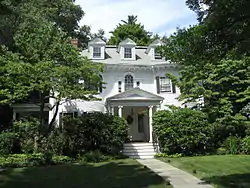Pine Ridge Road–Plainfield Street Historic District
The Pine Ridge Road–Plainfield Street Historic District encompasses a residential subdivision in the Waban section of Newton, Massachusetts. It includes 44 properties on Pine Ridge Road and Plainfield Street between Chestnut Street and Upland Road, and includes a few properties on the latter two streets. The area was laid out for development in the 1880s after the arrival of suburban rail service, and was built out by the 1930s. The district was listed on the National Register of Historic Places in 1990.[1]
Pine Ridge Road–Plainfield Street Historic District | |
 House on Plainfield Street | |
  | |
| Location | Roughly Pine Ridge Rd., Upland Rd., Plainfield St., and Chestnut St., Newton, Massachusetts |
|---|---|
| Coordinates | 42°19′38″N 71°13′29″W |
| Architect | Multiple |
| Architectural style | Late 19th And 20th Century Revivals, Bungalow/Craftsman, Late Victorian |
| MPS | Newton MRA |
| NRHP reference No. | 90000015 [1] |
| Added to NRHP | February 16, 1990 |
Description and history
Pine Ridge Road and Plainfield Street are residential streets located to the east of the central village of the Waban neighborhood of Newton. This area was farmland until 1886, when it was purchased by developers Charles Page and Frederick Henshaw. Early development in their subdivision took place west of Chestnut Street, and it was not until the 1890s that the area in this district, east of Chestnut Street, began. The area is architecturally diverse, with a modest number of 19th century Queen Anne and Shingle style houses, and a larger number of 20th century Colonial Revival, Tudor, and Craftsman houses. Some were architect-designed, and all are well-proportioned but not as large as those found in other neighborhoods.[2]
The oldest houses in the district date to 1897, and are Queen Anne in style. One of the finer examples is the Stetson House at 91 Pine Ridge Road, while 69 Pine Ridge Road sports a massive half-round porch in the style. Also built in 1897 is the Shingle style Davidson House at 24 Plainfield Street, while the Thomas James House (80 Pine Ridge), also in the Shingle style, may have been designed by its architect-owner. The George Heald house (99 Pine Ridge) is an example of English Tudor Revival architecture, with Tudor arch motifs, half-timbered gables and extensive use of diamond leadlight windows with heraldry symbols. The 1931 Colonial Revival house at 100 Pine Ridge is another architect-designed house, this one by Harry Ramsay, a prolific local designer.[2]
References
- "National Register Information System". National Register of Historic Places. National Park Service. April 15, 2008.
- "NRHP nomination for Pine Ridge Road–Plainfield Street Historic District". Commonwealth of Massachusetts. Retrieved 2014-04-19.
